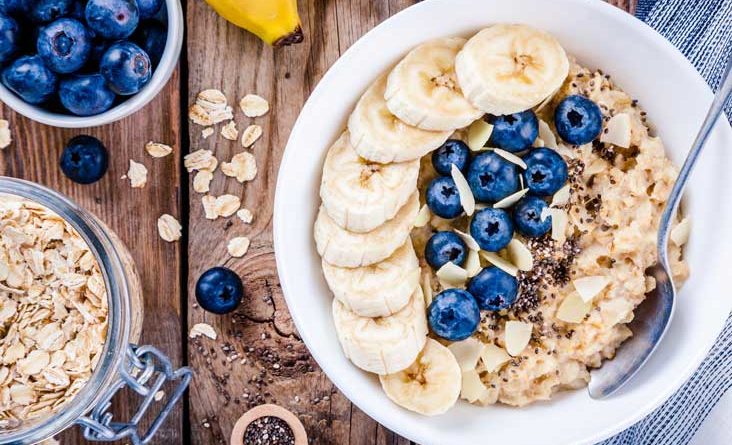11 Reasons Why You Should Eat Oatmeal for Breakfast
Goji berries, acai and maqui, quinoa – today only the lazy don’t talk about the exotic “healthy foods”. But there is an easily accessible superfood which has incredible properties. It is oatmeal. Let’s talk about this magic cereal and look at 11 reasons why it’s beneficial to eat it for breakfast.
1. Oatmeal Will Help You to Lose Weight
Oatmeal contains a special type of soluble fiber which is called beta-glucan. This cereal promotes the production of a hormone responsible for the control of our appetite. After eating oatmeal in the morning, the feeling of a full stomach and satiety can last up to several hours, eliminating the need for harmful snacks and the extra calories they come with.
2. Oatmeal Reduces Blood Pressure
American Journal of Clinical Nutrition published test results, according to which the effectiveness of oatmeal is similar to drugs that reduce blood pressure. So, people with high blood pressure will not be superfluous to include this cereal in their daily diet.
3. Oatmeal Normalizes Metabolism
Most already know that oatmeal is rich in fiber. But it contains both soluble and insoluble fiber. The first form of fiber improves the intestinal microflora, and the second one adjusts its peristalsis.
4. Oatmeal Protects the Body from Toxins
On the one hand, oatmeal nourishes the body, and on the other, helps it to get rid of “trash”. This is a unique product which will help you to detox your organism. And it also clears the arteries from excess fat and protects against heart disease.
5. Oatmeal Helps to Fight Insomnia and Bad Mood
Oatmeals help our body to produce a hormone which is responsible for satiety. It not only controls the appetite but it is also an antidepressant. Moreover, oatmeal eaten for dinner will solve your problems with bad sleep. Vitamin B6 contained in the cereal stimulates melatonin (sleep hormone) and serotonin, the lack of which leads to insomnia.
6. Oatmeal Regulates Cholesterol and Blood Sugar Level
You will not find another product that can regulate blood sugar and cholesterol levels, as well as oatmeal does. First, this cereal has a low glycemic index, and secondly, a soluble fiber which is contained in oats has a positive effect on sugar levels in all those who eat oatmeal systematically, and not only those who suffer from diabetes. In addition, oatmeal actively reduces cholesterol.
7. Oatmeal Protects the Body from Viruses and Bacterias
In the offseason, when our immunity is lowered and our organism becomes weaker, oatmeal is a great way to increase it. Beta-glucan trains the body’s natural defenses and its resistance to infections and viruses.
8. Oatmeal Reduces the Risk of Cancer
Scientists from Holland and the UK have proven that there is a direct link between fiber-rich food intake and reduced risk of cancer. You already know that oats contain a lot of fiber: a rich source of antioxidants protects the body from free radicals.
9. Oatmeal Improves Memory and Concentration
Oatmeal helps the brain and central nervous system to grow faster. That’s why it is a good meal for children. The silicon contained in it strengthens the neurons, carbohydrates give the brain energy, and vitamin B1 activates the blood supply to the brain, thereby improving memory and concentration.
10. Oatmeal Is a Good Source of Power
Why is it better to start the day with oatmeal instead of eating it at lunch? Athletes know this for sure: oatmeal is an ideal energy source containing all the B vitamins, phosphorus, calcium, iron, magnesium, copper, potassium, sodium, and fiber, which retain energy in the body for a long time.
11. Oatmeal Improves the Function of Intestines
Scientific studies show that oatmeal is capable of exerting an immunomodulating effect on the body by optimizing the function of intestines and improving the state of its microflora. The intestine is the largest immune organ of the body. Beta-glucan has a prebiotic effect, contributing to the growth of a population of beneficial intestinal bacteria.
In fact, oatmeal is a breeding ground for beneficial microorganisms (including bifidobacteria), it also reduces the development of harmful ones. However, milk oatmeal contains lactose and casein in its composition – some people may be allergic to these components, thus eliminating any benefit of oatmeal for breakfast.




